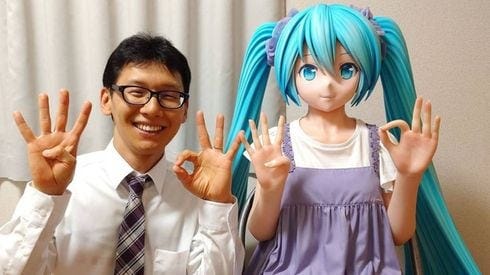There's Now A New Type Of Sexuality
Happy Monday!
As we dive into a brand-new week, let’s shake off the weekend vibes and gear up for some amazing content ahead.
And, your task for today?
📌 Write down one goal you want to achieve this week and share it with a friend
Now, let’s start with the day…
So, what’s fictosexuality?
It’s a term that’s been making waves recently, especially after the story of Akihiko Kondo, a 41-year-old man from Japan, who has been married to a virtual pop star - Hatsune Miku. Yes, you read that right. Miku isn’t real. She’s a fictional 16-year-old character created through vocaloid technology, which is a singing voice synthesizer software.
Now, Kondo isn’t just a fan of Miku, he’s emotionally and romantically attached to her. His connection to her goes way beyond just liking her music. Kondo first discovered Miku back in 2007, and her voice brought him comfort during a tough time in his life when he was dealing with bullying and emotional distress. Over the years, his admiration turned into a deep emotional bond, and in 2018, he went ahead and married her. Of course, the ceremony was a bit unconventional, held at a Tokyo chapel, with Miku attending as a hologram. The whole event cost Kondo around 2 million yen (roughly Rs 11 lakh).
This might sound bizarre to some, but for Kondo and many others, it highlights a deeper concept: fictosexuality.
It refers to a romantic or emotional attraction to fictional characters. It falls under the broader category of parasocial attachment, where individuals form one-sided emotional connections with celebrities, characters from TV shows, or, in this case, a virtual character.You might be thinking, “How can someone fall in love with a fictional character?”
Well, it’s not as unusual as it sounds. For many, forming deep emotional bonds with characters in books, movies, or games provides comfort, companionship, and a sense of belonging. These attachments can fulfill emotional needs that may not be met in real-world relationships. For Kondo, Miku wasn’t just a pop star; she was a source of solace and support.
Interestingly, the way fictosexuality is perceived depends a lot on cultural context.
In Japan, where virtual relationships are more common, people tend to be more accepting of such attachments. But in other cultures, like in the West, the concept can be met with confusion or judgment. Regardless, experts say that for some, this phenomenon is more than just an oddity, it can serve a real psychological role.
One of the reasons fictosexuality has gained attention is because it’s tied to broader societal changes. Today, many people are living more digitally connected lives. With social media, online games, and virtual platforms, we’re increasingly interacting with digital versions of reality. Yet, despite this hyper-connectivity, a lot of us still experience feelings of loneliness and isolation.
In a world where individualism is on the rise, where we are constantly working to be productive and stay afloat in the hustle culture, meaningful human connection can sometimes feel out of reach. For some, turning to fictional characters provides a sense of safety, emotional fulfillment, and attachment that they struggle to find in their everyday lives.
According to mental health professionals like Anuckriti Garg and Neha Cadabam, introversion and difficulty forming real-life relationships can also play a big role. Research has shown that people who struggle with high levels of anxiety or social discomfort are more likely to form parasocial relationships with characters. These connections can feel less intimidating than real-life interactions and offer a sense of control over emotional experiences.
However, while these attachments can offer comfort, they’re not without their challenges.
Experts also note that these relationships can sometimes create unrealistic expectations for real-life connections, which can make it harder for individuals to navigate interpersonal relationships.
So, is fictosexuality just a passing trend or something we should take more seriously?
It’s a complex issue, and there’s still a lot to explore. What we do know is that for some people, these emotional connections with fictional characters are genuine and provide a sense of security and comfort in an increasingly disconnected world. Whether we understand it fully or not, these relationships are real for those who experience them.
Anyway, that’s it for today. Let’s meet again tomorrow👋



